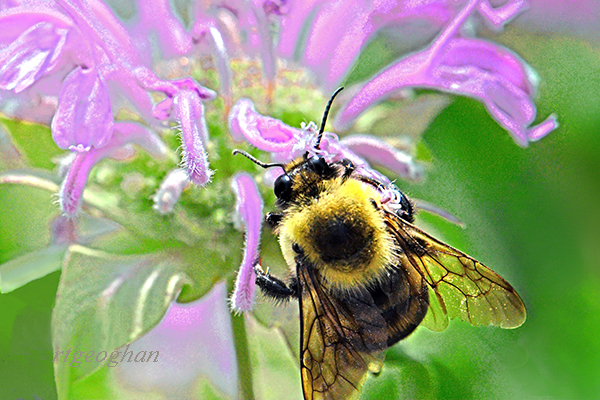
A close up view of a very busy bumble bee enjoying collecting pollen in ar garden patch of purple cone flowers.
Here’s the latest from our guest columnist Regina Geoghan. Thanks Regina!
Bumble Bee BUZZ
Have you ever stopped to watch a bumble bee in action? They are hard to miss, particularly in early and mid-summer, when the flowers begin to bloom. You might avoid them or simply ignore them but, hmmm, I don’t recall meeting anyone visiting DeKorte, Mill Creek or other Meadowland parks to watch bees.
Bird-watching, butterfly seeking yes. But bumble bees? If you’ve walked near the pollinator flower patches in the parks or your own garden, you have surely noticed them as they flit from flower to flower, sipping nectar, and sometimes coated with the yellow pollen. Noticed yes, but I think it is safe to say that for the most part, they are not really seen, understood or appreciated.
Appreciated??? Yes – and supported and protected. Why? Like honey bees they carry a huge responsibility for pollinating our food sources. They impact our food supply, the availability of fruits and other produce on supermarket shelves.
They affect the viability of the agriculture business in New Jersey and across North America. Like honey bees, their population are rapidly declining due to loss of habitat, pesticides and other causes. What’s worse, research is showing that bumble bees are even more susceptible than honey bees to pesticide damage. In New Jersey, the honey bee population is declining at a greater level than the rest of the country and this is suspected to be true of bumble bees and other native bees as well
While the honey bee hive losses and population decline have been getting a lot of attention in recent years, not much has been noted about bumble bees, whose effect on crop pollination is just as important, if not more so. Research is showing that these native bees are better pollinators than the honey bees.
They carry and spread pollen in different ways than honey bees, thereby affecting crops differently. Also, they seem to favor different sources of pollen. It is estimated that two-thirds of the world’s crop species depend on animals to transfer pollen, and bees are the most significant pollinators. And who knew that bumble bees played a starring role in this process?
So the next time you pass by a bumble bee in your garden or a park, stop and say “Thanks for visiting and have a good pollen gathering day.” Our food supply depends on it. Even better, plant flowers in your yard that will support the bees.
Regina Geoghan
August 9, 2017

